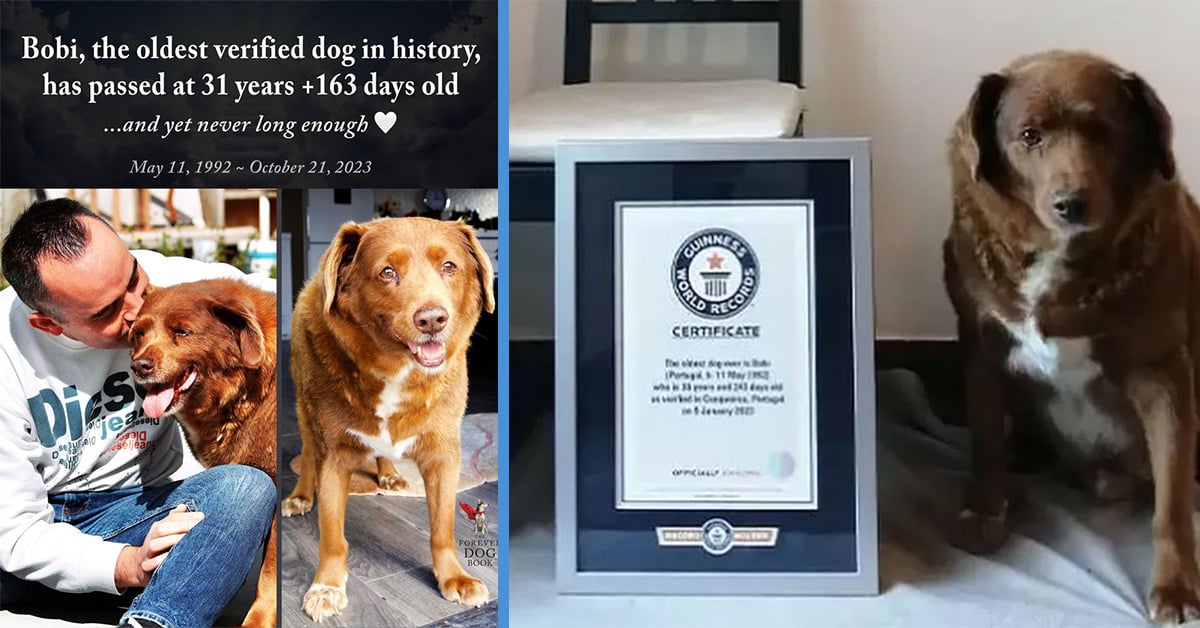On 21 October, it was reported that Bobi, the world’s oldest dog, had died at 31.
However, people began to raise their suspicions of Bobi’s actual age.
The Guinness World Records is currently investigating if Bobi really died at 31.
Investigations Ongoing
The Guardian reported that the Guinness World Records is investigating the claim that the Portuguese mastiff lived to 31 years and 165 days.
The average lifespan of Portuguese mastiffs is 12 to 14 years.
Thus, the news that Bobi lived for 31 years incited awe in many around the globe.
However, this amazement meant that more people were scrutinising media coverage of Bobi.
Some have pointed out that images of Bobi in 1999 show him having different coloured paws to the dog that died on 21 October.
Veterinarians have also raised other points of scepticism.
For instance, although Bobi’s age was registered on the national pet database, this is usually based on the owner’s self-certification.
Bobi was registered in 1991 with the Veterinary Medical Service of the Municipality of Leiria.
In addition, genetic testing merely confirmed that he was old and not his exact age.
Speaking to The Guardian, a Guinness World Records spokesperson said, “We’re aware of the questions around Bobi’s age and are looking into them.”
What Professionals Have to Say
Danny Chambers, a veterinarian and council member of the Royal College of Veterinary Surgeons, claimed that of the 18,000 members of the Veterinary Voices group he is in charge of, “not a single one” of his colleagues believe that Bobi was 31 years old.
He added, “This is the equivalent for a human to living to over 200 years old, which, given our medical capabilities, is completely implausible. Extraordinary claims require extraordinary evidence, and no concrete evidence has been provided to prove his age.
“We are a science-based profession, so for the Guinness Book of Records to maintain their credibility and authority in the eyes of the veterinary profession, they really need to publish some irrefutable evidence.”
Notably, scientists have found that dogs do not age at seven times the rate of humans, contrary to popular belief.
In 2020, it was reported that researchers at the University of California San Diego’s School of Medicine found that a one-year-old dog would have a “human age” of about 30.
According to their findings, dogs show a more rapid accumulation of methyl groups in their genome in their first year than humans.
Chambers also warned of the dangers of Bobi’s claim to longevity.
As the mastiff ate human food, Chambers added that anti-pet food zealots have been using Bobi’s example to campaign that raw feeding is better than dog food.
Andrew Knight, emeritus professor of veterinary welfare, said that it would be helpful to the investigation to compare Bobi with five to ten other oldest dogs and see if he was an outlier.
Who was Bobi?
His death was announced on Facebook by Dr Karen Becker, an American veterinarian who had met Bobi in February following his certification as the world’s oldest living dog.
The Portugal News reported that she was also at Bobi’s birthday party earlier this year.
According to Guinness World Records, a big “traditional Portuguese party” was planned in honour of Bobi’s 31st birthday.
Mr Leonel Costa, Bobi’s owner, attributed his long life to “good nutrition, constant contact with nature, freedom to explore his environment, consistent veterinary care, and love”, according to Dr Becker’s Facebook tribute to the mastiff.
Mr Costa said, “Bobi knows he’s deeply loved.”
When he was eight, he rescued Bobi from being put down by his parents.
His parents had felt that there were too many animals in the family.
Mr Costa and his brothers took care of Bobi in secret.
When this was discovered, Bobi was allowed to continue being part of the family.
Bobi was a pure-bred rafeiro do alentejo, a breed of livestock guardian dogs.
He lived his whole life with the Costa family in the rural village of Conqueiros in Leiria, Portugal.
According to Chambers, he occasionally sees dogs reach their late teenage years.
However, he noted that these dogs tend to be smaller breeds and not overweight.
He added that owners are often unsure of the exact age of their dog.
Furthermore, owners tend to be uncertain of their dog’s precise age if it was rehomed.
According to the scientific journal Nature, small dogs live one or two years longer than larger breeds.
A 2013 study on the relationship between a dog’s size and mortality concluded that large dogs tend to die at a younger age because they age faster.
Speaking to Forbes, certified professional dog trainer and pet lifestyle expert Nicole Ellis said, “Dog ageing isn’t a perfect science, and it isn’t even the same from dog to dog.
“Dogs mature more quickly in the first few years of their life, compared to later years, so all years are not equal.”
The Costa family mentioned that Bobi came from a family with good genes.
His mother died at 18 years old.
Another one of the family’s dogs died at 22.



